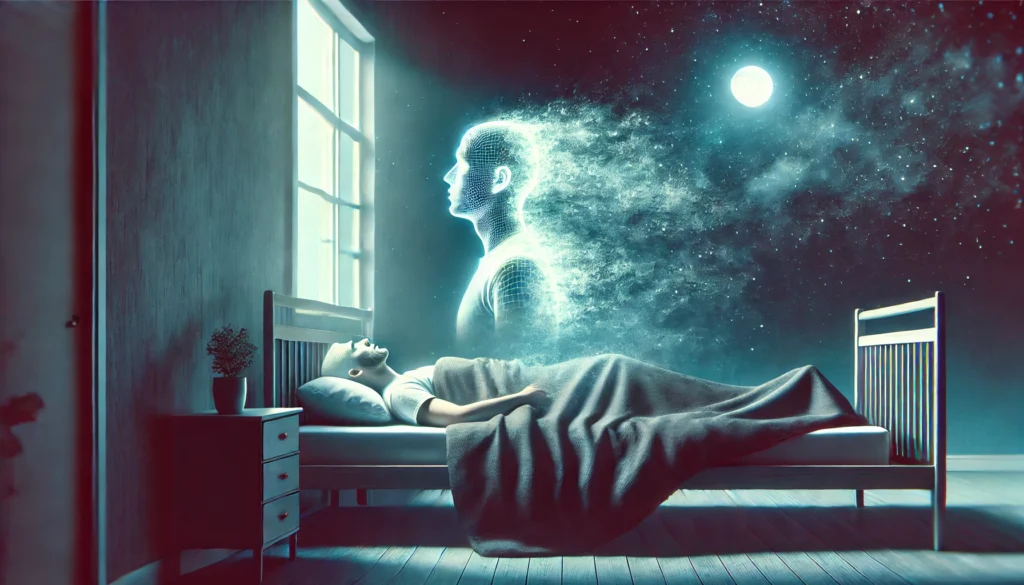Imagine waking up in the morning only to find that you have no recollection of falling asleep or what transpired during the night. Such is the perplexing experience of those who encounter amnesia sleep. In this article, we delve into the intricacies of amnesia sleep, exploring its causes, effects, and the fascinating science behind it.
You may also like: The Connection Between Sleep and Memory
What is Amnesia Sleep?
Amnesia sleep refers to a phenomenon where individuals experience a loss of memory related to their sleep activities. This isn’t merely forgetting dreams; it is a complete lack of awareness of having slept at all. While not as commonly discussed as insomnia or other sleep disorders, amnesia sleep poses its unique set of challenges and questions.
Differentiating from Common Sleep Disorders
Amnesia sleep is distinct from other sleep disorders like insomnia and sleep apnea. Unlike insomnia, where individuals struggle to fall or stay asleep, those experiencing amnesia sleep may have no issues with sleep duration or quality but fail to recall the act of sleeping. Sleep apnea often involves breathing interruptions, whereas amnesia sleep centers around memory lapses.
Historical Understanding
Historically, amnesia sleep was often overshadowed by more widely recognized sleep disorders. As our understanding of sleep has evolved, researchers have begun to identify and categorize this unique phenomenon, acknowledging its existence as a separate condition worthy of study and treatment.
Psychological Perspectives
Psychologists are interested in how amnesia sleep affects cognitive functions and emotional well-being. The inability to remember periods of sleep can lead to anxiety and stress, as individuals feel disconnected from their own experiences. Exploring the psychological implications of amnesia sleep is crucial for developing effective therapeutic approaches.
The Science of Sleep and Memory
To comprehend amnesia sleep, we must first understand the interplay between sleep and memory. Sleep is crucial for memory consolidation, a process where our brains convert short-term memories into long-term ones. This occurs during specific sleep stages, particularly rapid eye movement (REM) sleep and slow-wave sleep (SWS).
The Role of REM Sleep
During REM sleep, the brain is highly active, processing emotions and integrating new information. This stage is particularly vital for the consolidation of procedural memories, which involve learning tasks and skills. Disruptions in REM sleep can lead to fragmented memories or, in the case of amnesia sleep, a complete absence of them.
Importance of Slow-Wave Sleep
Slow-wave sleep (SWS) is essential for declarative memory consolidation, which involves facts and knowledge. This deep sleep stage is crucial for the brain’s restorative processes, and disruptions can result in incomplete memory consolidation. In amnesia sleep, the absence of SWS can lead to significant gaps in memory.
Neural Mechanisms Behind Memory Loss
Recent research has identified specific neural pathways and brain regions involved in memory formation and retention. The hippocampus, a critical area for memory, may show altered activity in those with amnesia sleep. Understanding these neural mechanisms can guide future interventions and treatments.

Causes of Amnesia Sleep
Several factors can contribute to amnesia sleep, ranging from lifestyle choices to underlying medical conditions.
Medication and Substance Use
Certain medications, particularly those affecting the central nervous system, can lead to memory disturbances during sleep. Benzodiazepines, commonly prescribed for anxiety and sleep disorders, are known to interfere with REM sleep, potentially causing amnesia sleep. Similarly, alcohol and recreational drugs can disrupt sleep architecture, leading to memory gaps.
The Impact of Prescription Drugs
Prescription drugs, especially those designed to alter mood or neurological function, can have unintended side effects on sleep memory. Patients should be aware of these potential effects and consult healthcare providers to discuss alternatives if memory issues arise.
Recreational Drugs and Memory
Recreational drug use can significantly impair memory functions, not only during waking hours but also affecting sleep patterns. The disruptions caused by these substances can lead to a cycle of poor sleep quality and memory loss, exacerbating the issue of amnesia sleep.
Alcohol’s Role in Sleep Disruption
While alcohol is often used as a sleep aid, it can disrupt the natural sleep cycle, leading to fragmented sleep and impaired memory consolidation. The initial sedative effects are followed by disruptions in REM sleep, contributing to memory lapses.
Sleep Disorders
Conditions such as sleep apnea and parasomnias can also result in amnesia sleep. Sleep apnea causes frequent awakenings during the night, often without the individual’s awareness, leading to fragmented sleep and memory loss. Parasomnias, which include sleepwalking and night terrors, can disrupt normal sleep patterns and cause amnesia of the events.
Sleep Apnea and Memory Fragmentation
Sleep apnea involves repeated interruptions in breathing during sleep, leading to frequent awakenings. These interruptions can fragment sleep cycles, preventing the deep, restorative sleep necessary for memory consolidation, thereby contributing to amnesia sleep.
Parasomnias: Beyond Night Terrors
Parasomnias encompass a range of disruptive sleep behaviors, from sleepwalking to night terrors. These involuntary actions can break the continuity of sleep, leading to periods of amnesia where the individual has no memory of the events.
Insomnia’s Indirect Effects
While insomnia primarily affects the ability to fall and stay asleep, its indirect effects on sleep quality can also contribute to memory issues. The lack of restorative sleep can exacerbate memory lapses, leading to experiences akin to amnesia sleep.
Stress and Mental Health
Chronic stress and mental health disorders such as depression and anxiety can exacerbate sleep disturbances, including amnesia sleep. Stress hormones like cortisol can interfere with sleep processes, impacting memory consolidation.
The Role of Cortisol
Cortisol, a hormone released in response to stress, can disrupt sleep patterns by increasing alertness and reducing the time spent in deep sleep stages. This disruption can hinder memory consolidation, leading to experiences of amnesia sleep.
Anxiety’s Impact on Sleep
Anxiety can lead to racing thoughts and difficulty falling asleep, but it also affects sleep quality. The heightened state of alertness can reduce REM and SWS stages, crucial for memory consolidation, contributing to amnesia sleep.
Depression and Sleep Disruption
Depression often leads to irregular sleep patterns, including difficulty maintaining consistent sleep stages. This inconsistency can prevent effective memory consolidation, resulting in memory gaps and feelings of amnesia sleep.
Effects of Amnesia Sleep
The repercussions of amnesia sleep extend beyond mere forgetfulness. It can have significant implications for an individual’s daily life and overall well-being.
Cognitive and Emotional Impact
The inability to recall sleep can lead to cognitive challenges during waking hours. Individuals may experience difficulties with attention, concentration, and decision-making. Emotionally, the uncertainty and confusion surrounding memory loss can contribute to heightened anxiety and stress.
Cognitive Impairments
Amnesia sleep can lead to noticeable cognitive impairments, affecting short-term memory and executive functions. This can result in trouble focusing on tasks, making it challenging to complete daily activities efficiently.
Emotional Repercussions
Emotionally, the experience of amnesia sleep can be disorienting and distressing. The lack of memory can lead to feelings of disconnection and fear, further exacerbating stress and anxiety levels.
Anxiety and Stress Amplification
The cycle of memory loss and anxiety can feed into each other, creating a loop where stress exacerbates sleep issues, leading to further memory lapses. Breaking this cycle is crucial for restoring both cognitive and emotional health.
Social and Occupational Consequences
Amnesia sleep can affect social interactions and job performance. Forgetting crucial conversations or tasks can strain relationships and hinder professional responsibilities. Moreover, the fear of not recalling nighttime events can lead to increased social withdrawal and isolation.

Impact on Relationships
Amnesia sleep can create misunderstandings and tension in personal relationships. Forgetting significant discussions or events can lead to feelings of neglect or dismissal from loved ones, straining relationships.
Professional Challenges
In the workplace, memory lapses can result in missed deadlines, forgotten tasks, and decreased productivity. The fear of these occurrences can increase stress, compounding the effects of amnesia sleep.
Social Withdrawal
The anxiety surrounding memory loss can lead individuals to withdraw from social activities, fearing embarrassment or awkward situations. This isolation can further affect mental health, creating a barrier to recovery.
Sleep Studies: Unraveling the Mystery
Sleep studies, or polysomnography, offer valuable insights into sleep patterns and can help diagnose amnesia sleep. By monitoring brain waves, eye movements, and muscle activity, sleep studies provide a comprehensive view of an individual’s sleep architecture.
Advances in Sleep Research
Recent advancements in sleep research have shed light on the mechanisms underlying amnesia sleep. Studies using neuroimaging techniques have revealed altered connectivity in brain regions associated with memory, offering potential avenues for therapeutic interventions.
Neuroimaging Techniques
Neuroimaging, including MRI and PET scans, has allowed scientists to observe brain activity during sleep. These images have shown differences in brain connectivity in individuals experiencing amnesia sleep, providing clues to underlying causes.
Genetic Research
Emerging research into the genetics of sleep has identified potential markers associated with sleep-related memory issues. Understanding these genetic factors may lead to personalized treatment approaches for those affected by amnesia sleep.
Innovative Therapies
Advancements in technology have spurred the development of innovative therapies, such as transcranial magnetic stimulation (TMS) and neurofeedback. These therapies aim to modulate brain activity, potentially improving memory consolidation during sleep.
Practical Advice for Managing Amnesia Sleep
While understanding the causes and effects of amnesia sleep is crucial, managing the condition requires practical strategies and lifestyle adjustments.
Prioritizing Sleep Hygiene
Maintaining good sleep hygiene is essential for overall sleep quality and memory retention. This includes establishing a regular sleep schedule, creating a relaxing bedtime routine, and ensuring a comfortable sleep environment.
Establishing a Sleep Routine
Consistency is key in sleep hygiene. Going to bed and waking up at the same time each day helps regulate the body’s internal clock, improving sleep quality and reducing memory lapses.
Creating a Relaxing Environment
A calm and comfortable sleep environment can enhance sleep quality. Consider factors such as room temperature, lighting, and noise levels to create an atmosphere conducive to restorative sleep.
Limiting Screen Time
Reducing exposure to screens before bed can help signal the body that it’s time to wind down. The blue light emitted by screens can interfere with melatonin production, disrupting sleep patterns.
Mindfulness and Stress Reduction
Incorporating mindfulness practices and stress-reduction techniques can help mitigate the impact of stress on sleep. Techniques such as meditation, deep breathing, and progressive muscle relaxation can promote relaxation and improve sleep quality.
Meditation Practices
Mindfulness meditation can calm the mind and prepare the body for sleep. Even a few minutes of focused breathing or guided meditation before bed can significantly improve sleep quality.
Deep Breathing Exercises
Deep breathing exercises can activate the body’s relaxation response, reducing stress and anxiety levels. Practicing these exercises before bedtime can help transition the mind into a restful state.
Progressive Muscle Relaxation
Progressive muscle relaxation involves tensing and then releasing different muscle groups. This technique can help release physical tension and promote a sense of calm, aiding in falling asleep more easily.
Seeking Professional Help
For individuals experiencing persistent amnesia sleep, consulting a healthcare professional is crucial. A sleep specialist can conduct thorough assessments, recommend appropriate interventions, and explore potential underlying medical conditions.
Consulting a Sleep Specialist
A sleep specialist can provide personalized insights into an individual’s sleep patterns, offering tailored strategies to address amnesia sleep. Their expertise is invaluable in navigating the complexities of sleep disorders.
Exploring Treatment Options
Various treatment options, including cognitive-behavioral therapy for insomnia (CBT-I) and medication adjustments, may be considered based on individual needs. Professional guidance can help identify the most effective approach.
Addressing Underlying Conditions
If amnesia sleep is linked to other medical conditions, such as depression or anxiety, addressing these issues is crucial. Comprehensive treatment plans that tackle both sleep and mental health can lead to more effective outcomes.

Conclusion
Amnesia sleep, though less commonly discussed, is a complex phenomenon with profound effects on memory and daily functioning. By understanding its causes and effects, individuals can take proactive steps to manage and mitigate its impact. As sleep research continues to evolve, there is hope for more effective treatments and interventions in the future.
In the ever-evolving landscape of health and wellness, staying informed about sleep-related phenomena like amnesia sleep is essential. By weaving historical context, current trends, and future implications into our understanding, we pave the way for a more comprehensive and insightful approach to sleep health. As we continue to unlock the mysteries of sleep, the potential for enhancing both individual and collective well-being grows ever more promising.
Further Reading:
Sleep Modifications in Acute Transient Global Amnesia
Important Note: The information contained in this article is for general informational purposes only, and should not be construed as health or medical advice, nor is it intended to diagnose, prevent, treat, or cure any disease or health condition. Before embarking on any diet, fitness regimen, or program of nutritional supplementation, it is advisable to consult your healthcare professional in order to determine its safety and probable efficacy in terms of your individual state of health.
Regarding Nutritional Supplements Or Other Non-Prescription Health Products: If any nutritional supplements or other non-prescription health products are mentioned in the foregoing article, any claims or statements made about them have not been evaluated by the U.S. Food and Drug Administration, and such nutritional supplements or other health products are not intended to diagnose, treat, cure, or prevent any disease.


